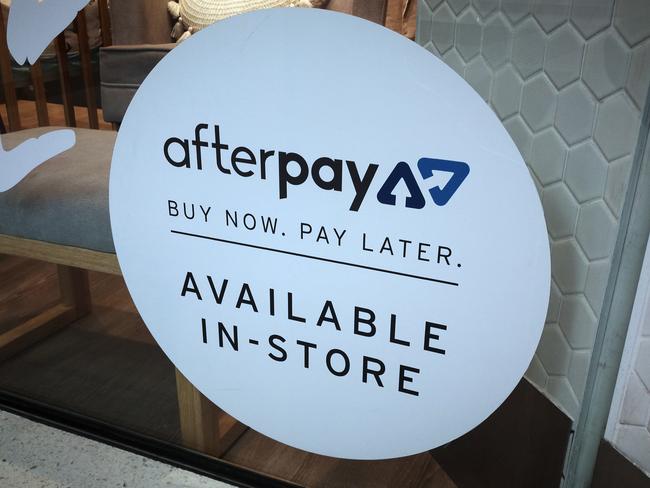Buy Now, Pay Later: Industry set to unveil new minimum standards
Afterpay and similar services could be publicly exposed for breaching new minimum standards, which bring changes for consumers.
Money
Don't miss out on the headlines from Money. Followed categories will be added to My News.
Consumers groups have slammed a move by the booming Buy Now, Pay Later sector to self-regulate, saying its new code does not go far enough.
News Corp Australia has seen a draft copy of the code, developed under the guidance of the Australian Finance Industry Association (AFIA), which sets out minimum standards for the industry.
It will be overseen by a Code Compliance Committee which could “publicly name and shame” members in the event of serious breaches.
Under the code, new customers will face tougher checks if they want to spend more than $15,000, including the BNPL provider assessing existing customer data and conducting a credit check to ensure customers can meet repayments.
However, it does not compel them to run external checks if the transaction amount is under $2000, meaning they can continue to rely on their external systems to establish whether a customer can use the service.
The code would require providers to conduct anti-money laundering identity checks, ensure customers can make the first payment upfront, and restrict consumers from making further purchases if they are behind on repayments. They will also be banned from advertising their products to minors.

Some companies already follow many of the rules, such as Afterpay where its maximum transaction limit of $2000 is reserved to those who have “previously demonstrated strong repayment capability.”
The code also stipulates signatories won’t launch bankruptcy proceeding against customers, and they would consider waiving fees and charges to those in financial hardship.
It’s understood a the Committee is currently assessing Afterpay, OpenPay, Payright, Zip, Brighte, Humm, Klarna and Latitude to ensure they can adhere to the new rules.
They will sign on to the code once approved, and consumers will know which providers are following it through a logo displayed on their websites.
Consumer advocacy groups Choice, the Financial Rights Legal Centre, Financial Counselling Australia and the Consumer Action Law Centre said the code, which is set to be unveiled next week, was a “positive” step but more needed to be done.
“BNPL is credit and should be regulated like other credit products,” they said.
“Consumer groups see the harm BNPL services cause first-hand. This includes an increasing
number of people who end up in unaffordable debt through using them, poor industry hardship
practices and excessive late fees.”

They said BNPL providers were not required to hold a credit licence, and that meant the Australian Securities and Investments Commission could not take enforcement action against them if they breached lending standards.
“BNPL providers run a mile at the mention of the word ‘credit’, telling their customers the service is all about better budgeting. What they tell retailers however is much closer to the truth – that BNPL encourages people to spend more,” Financial Counselling Australia CEO, Fiona Guthrie said.
“What BNPL providers are really doing is turning a loophole in the law into a gaping hole.”
Consumer Action Law Centre CEO, Gerard Brody, said self-regulation was often a “fig leaf” and the code did not require “every BNPL loan to be suitable and affordable for the individual customer.”
An AFIA spokesperson said BNPL providers were required to meet “various legal and regulatory obligations” and had oversight from ASIC, the Australian Competition and Consumer Commission, AUSTRAC, the Office of the Australian Information Commissioner, and the courts.
They said the BNPL code would be overseen by the Committee, which was separate to AFIA that included an independent Chair, a representative with industry and legal experience, and a consumer representative.
“This Committee has monitoring powers and also a broad range of sanctions available to them if there are breaches of the Code – up to and including publicly naming members who have had a significant breach.”
More Coverage
Originally published as Buy Now, Pay Later: Industry set to unveil new minimum standards




